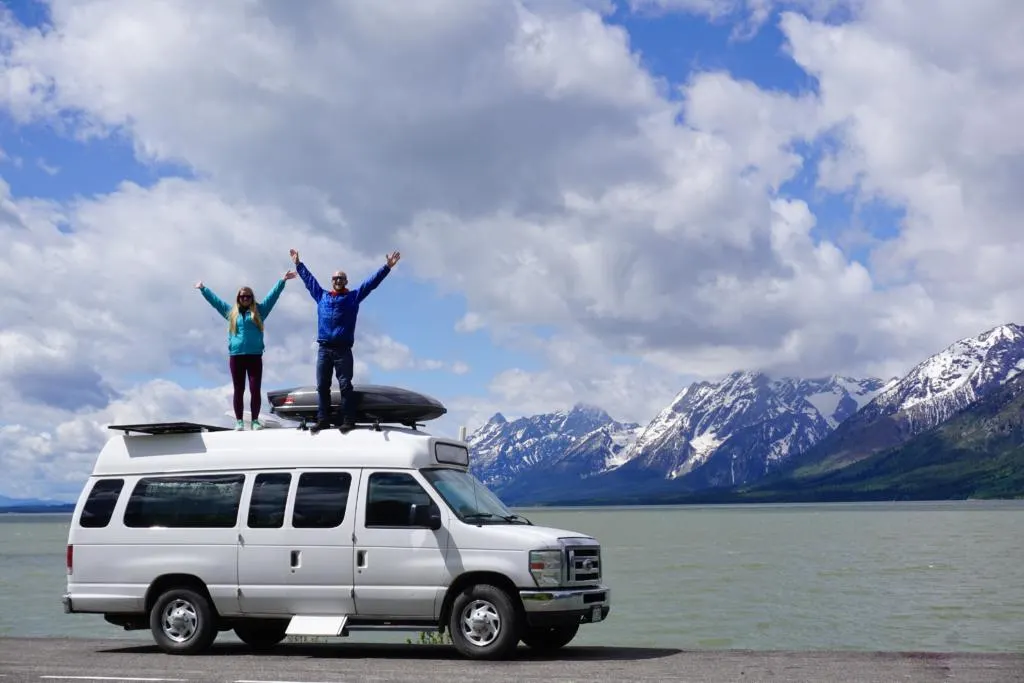
Seasonal jobs are a popular method for making money to sustain vanlife. I know, everyone is obsessed with remote work, and it seems like every vanlifer is a blogger, freelance writer, Youtuber, or programmer. But, remote work won’t be the answer for everyone. Emily and I personally have lots of experience with seasonal work and want to share the things we’ve learned. This website is our dream job, but for years we barely made any money. The reality is that we have been working seasonal jobs to sustain vanlife travel.
And even if you don’t have a campervan or RV, there are many seasonal positions that provide housing. We started seasonal work while still living in an apartment, so there’s more than one type of person who can learn from this post.
Seasonal work is a great fit for our lifestyle because we like to have extended periods of time off for travel. It’s a great way to make money in the short term, without being tied to a year-round job. And many employers in tourism, hospitality, outdoor recreation, and agriculture only need the extra employees during their busy season. And they also may not have enough housing for their workforce, so it’s a win-win for both parties.
Seasonal employment comes in many forms, like ski towns in the winter, campgrounds in the summer, and farms during peak harvest. But there are loads of other jobs and locations you can find seasonal work.
Seasonal work is most popular in areas that see a high volume of seasonal tourists or experience a large spike in labor needed.
- National Parks
- Ski Towns
- Campgrounds
- Summer Resorts
- Golf Courses
- Raft Guiding
- Fishing Guide
- Restaurants
- Farms/Ranches
- Boating / Yachting
- Shipping Centers
This post covers what we like and dislike about the lifestyle, how to find seasonal jobs that might interest you, and some real-life examples of seasonal work we’ve done.
What We Like About Seasonal Work
Seasonal work comes in so many different flavors that it’s hard to boil it down to one experience. But the variety and changing of scenery is one of the most attractive parts of the lifestyle.
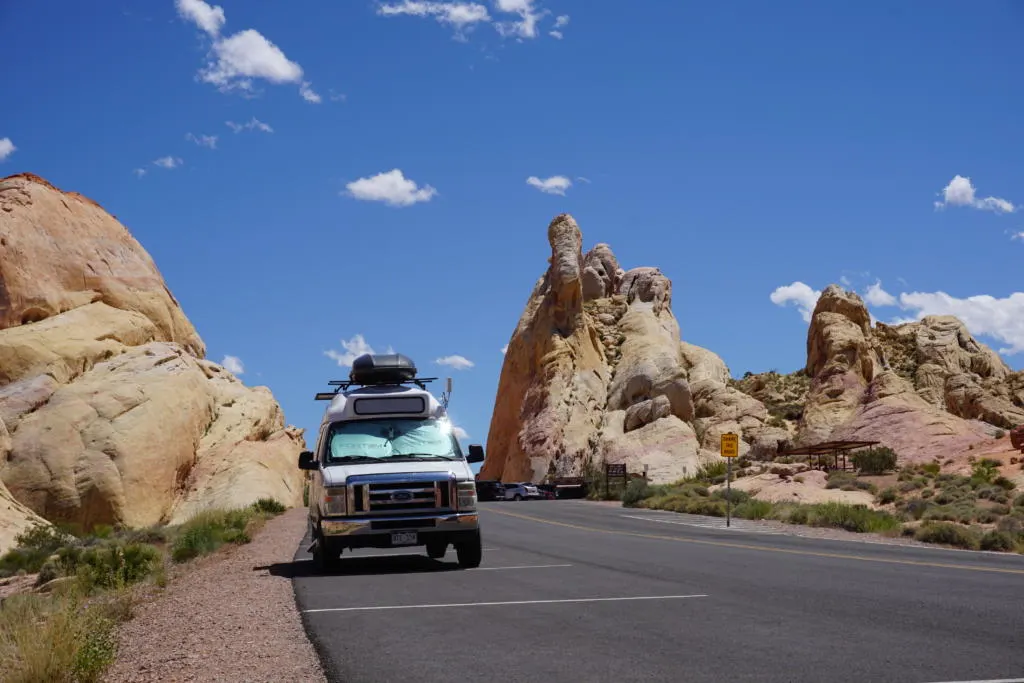
Choose Where You Want To Live & Work
You get to choose where you live and work. We love to pick a new area that interests us and find seasonal work there. It gives us a chance to really explore a place over several months, while still earning money to fund our lifestyle.
You could spend the winter working at a ski resort, summer at a lake resort, and have a couple of months off in between to travel. Or if you’ve always wanted to visit Yellowstone National Park, then you can find a job there. Really, the possibilities are endless.
Save Up Money In A Short Period Of Time
Seasonal works allows us to work hard for a short period and aggressively save up some money. The average seasonal job varies between 2 to 6 months depending on the needs of the employer.
{Related Post: Best Bank Accounts For Vanlife}
Emily and I kind of fell into the seasonal work lifestyle by accident. We both moved to Vail, Colorado after college to chase powder days in the mountains. Emily found a job as a snowboard instructor on the resort, and I worked valet at a private club. We both got a second job working at a restaurant, which is where we met. But when the ski season ended in the spring, the tourists stop coming and most of the businesses close up shop. There are a couple of months before summer tourism jobs start up.
With a couple months to spare, we planned a camping trip to Utah. This is long before we even considered vanlife, just a couple young kids going on an extended tent-camping adventure to visit some national parks. But these extended camping trips are what planted the seeds that would eventually lead us to vanlife. There’s something so special and unique about trips that last longer than a weekend. On a weekend trip, you can never truly free your mind from the dread of Monday morning.
Extended Time Off For Travel
We eventually realized that vanlife and seasonal work are an ideal pairing. The ability to work for a couple of months and then have a few months off to travel is a perfect balance. We love nothing more than our extended time spent traveling with no strict timeline.
Jobs With A Set End Date
And the nice thing about seasonal work is that it’s employment with a set end date. So when you take off at the end of the season, there’s no hard feelings.
And I don’t know about you, but we get burnout after working the same job for a while. So knowing that there is an end in sight always makes it easier to push through a couple hard months of work. And if you are a good worker, then employers are usually happy to have you come back in the future.
What We Don’t Like About Seasonal Jobs
So up until now, I’ve mostly been talking about what we like about seasonal work. But there are definitely some negatives to the lifestyle.
Sometimes Poor Compensation

Many seasonal jobs use the value of their location, or other perks to justify paying lower wages than people would normally accept. For example, the job might provide a free campsite, free ski pass, exclusive discounts, or simply just the perks of living in such a cool place. So sometimes you may end up working for lower wages, but ultimately be happy because of the other perks.
The key for us is really trying to identify the seasonal jobs that actually pay well.
Or another challenge is figuring out how much you make in tips. With a tipped position, you may not actually know how much money you will make when accepting the position. This makes it a little bit of a gamble accepting a seasonal job with tips.
Ignoring The Slow Times
A common misrepresentation of tipped jobs is to use the most lucrative days and extrapolate that number across a whole season. This mindset ignores the fact that most tourism-based jobs experience variations between busy and slow periods.
It’s human nature for people to specifically remember and brag about the time they made $300 in one night as a bartender. But people are much less likely to talk about all the slow shifts where they only walked away with $40 in tips. So, we try to keep track of our total tips and average them out across the entire season. This gives a much more accurate picture of how much money we made per hour.
Lack of Savings
We find that it’s hard to build up savings when doing seasonal work. You may make a decent chunk of money over a summer, only to watch it dwindle away while you travel unemployed until winter. But this all depends on your earnings versus your cost of living.
Vanlife can definitely help bring the cost of living down. But you often need to keep a good balance between time worked and time unemployed. It’s unlikely that you would make enough money in the winter to take off the entire spring, summer, and fall.
Some people may be better than others at being disciplined and building up their savings. But in our experience, it’s just hard to really get ahead.
Seasonal work isn’t a great option if you are hoping to build up savings to buy a house, pay for school, or start a family. In our early twenties, we were fine making enough money to just get by. But as Emily and I have gotten older, we find ourselves feeling like we need more consistent income streams to take the “next steps” in our lives. So we have devoted ourselves to this blog as a complement to the money we make from seasonal jobs.
Harder To Move Up
Seasonal work makes it sometimes challenging to move up in a job or build a cohesive resume. Businesses are usually looking for more committed year-round workers to move up into managerial roles.
And your resume begins to take on a very unconventional form. Hiring managers may see the large gaps in your work history as a red flag. Or the sporadic nature of jobs held in a variety of positions can signal a “flakey” worker without purpose or commitment.
There was a time when I planned to follow the traditional career path set forth by my east coast collegiate upbringing. (i.e. go to college, get an internship, start a career in some major metro area, etc.). For a while, it scared me to feel like I was slipping farther and farther away from that path. I have since come to terms with the fact that my path to success and happiness will look different than that.
Yes, some employers in the future may dismiss me based on my unconventional work history. But if they can’t see the value of my unique and diverse experiences, then it’s probably not the type of company I want to work for anyway.
Ski Towns Aren’t A Great Fit For Vanlife
The reality is that ski towns are not a great fit for vanlife. This is because most campgrounds, forest roads, and BLM land are closed to vehicles in the winter. So many of the places that vanlifers may camp in the summer are not available in the winter. And ski towns typically are quite restrictive about parking in general, let alone people trying to vehicle camp on the street.
So expect some extra challenges when trying to vanlife for seasonal jobs in a ski town. It may be worth looking into seasonal jobs that provide housing.
{Read: How To Find Affordable Housing In A Ski Town}
Getting Overworked

Overworking from seasonal jobs can take many forms, and this isn’t an indictment on ALL seasonal jobs everywhere. But we’ve worked enough of them over the last 9 years to see some recurring patterns.
Many seasonal jobs are exempt from traditional worker protections. So you may be required or encouraged to work 10-12 hour days. Sometimes we prefer the longer days because we are ready to grind and make as much money as possible in a short time.
And volatile staffing can often result in you being scheduled for more shifts than you planned. There have been plenty of times where our boss schedules us on one of our “days off”. And ahead of time it’s easy to think you’ll have the conviction to put your foot down and not pick up an extra shift. But once you’ve become close with your coworkers, you feel compelled to help out because you know who gets affected. But this can be a slippery slope that results in becoming overworked if there are consistently staffing issues.
Not Enough Free Time To Explore
Pretty much all of the seasonal jobs we accept are based on location. So we are always excited to get out on adventures in the surrounding area. But because of the previous point about overworking, sometimes you feel like you don’t have enough free time to explore. Or you might be so exhausted on your days off that you don’t have the energy for your hobbies and passions. And that kind of defeats the whole point for us. So it’s just something to be aware of with seasonal work.
And somewhat related is that since you are only there for a short time, it’s typically assumed that you won’t take any extended time off during the employment. And some seasonal jobs require you to work on holidays and weekends. Most notably for us is that in ski towns, Christmas is a super busy time. Consequently, I have not celebrated Christmas with my family for many years.
Complicated Taxes
This isn’t that big of a deal (until you finally have to do your taxes). But last year we filed taxes in Colorado, Arizona, and Idaho all in the same calendar year. A variety of W2’s can make it more annoying to do your taxes. And I presume the weirdness is what caused the IRS to flag my tax return and ask for additional documents. I didn’t get my refund until August.
-> Pros
- Set end dates
- Live/work in beautiful places
- Make good money in a short period
- Time-off to travel
- Travel to new places
-> Cons
- Poor compensation / Slower periods
- Lack of savings
- Harder to move up
- Vanlife difficult in ski towns
- Getting overworked / Lack of Free Time
- Complicated taxes
How To Find Seasonal Jobs
Seasonal Work Specific Websites
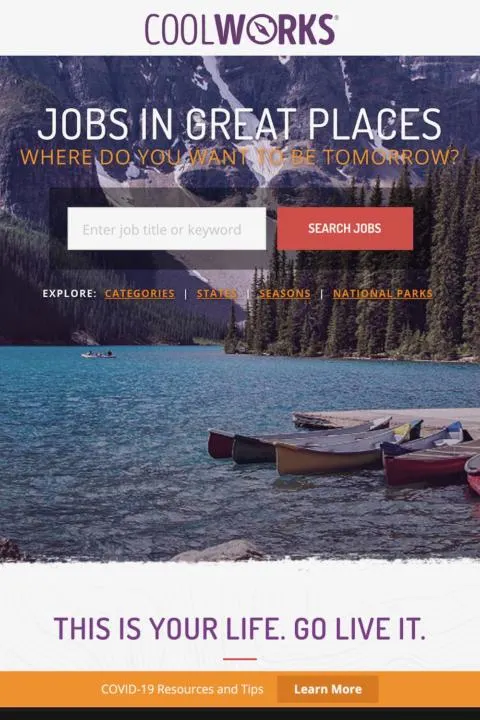
The most formal places that we know for finding seasonal work are websites that specialize in hosting seasonal job listings. Our two favorite websites to find these jobs are Coolworks.com and Vagajobs.com. Both websites host jobs listings for all kinds of seasonal employment, but they definitely lean towards outdoorsy jobs and locations. The list is quite extensive, but some of the most popular categories are national parks, golf courses, ski resorts, restaurants, summer camps, farms/ranches, river rafting, fishing, and lots more.
Work Camping Positions
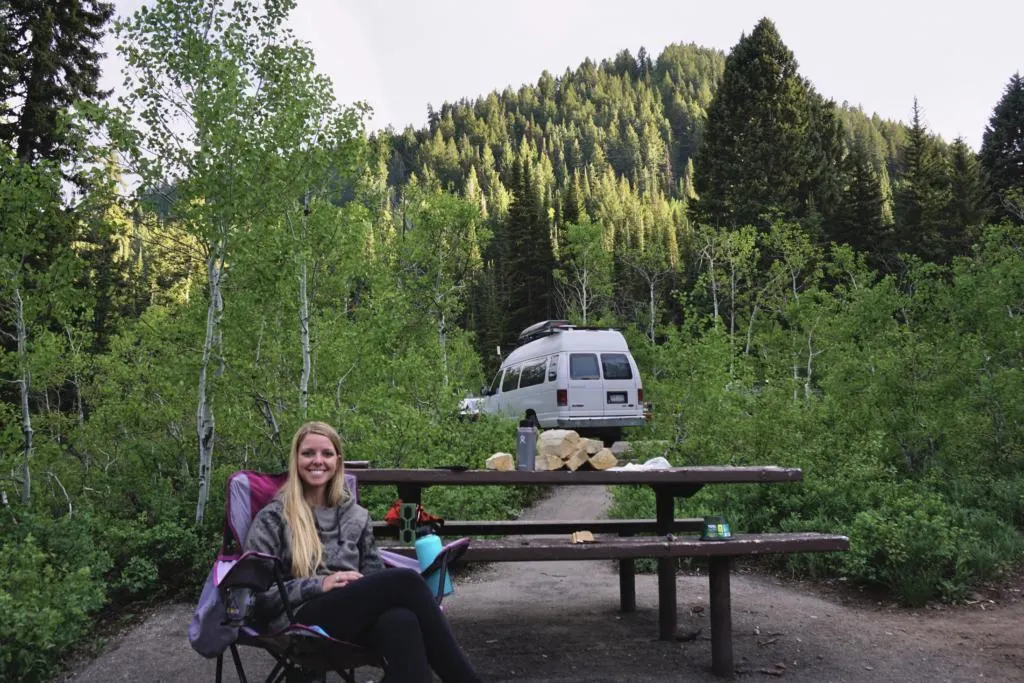
Another really common type of seasonal work is “work camping” positions that specifically focus on campground hosting. The campground provides a place for your home on wheels, and you get a (usually paid) position as campground host, maintenance, etc. Websites like WorkampingJobs.com, Workamper.com, Kamperjobs.com have lots of these positions posted, typically more in the summer.
In our experience, work camping positions offer subpar or no compensation/wages. They justify this by providing a free place to stay (campsite). So the value of the campsite is typically factored into the compensation. And it often includes hookups (i.e. electric, water, and sewage). This arrangement seems to work better for retired RV’ers who are more concerned with saving money than making money. But if your main goal is to earn a lot of money, then work camping positions are usually not a good fit.
Agriculture & Farm Jobs
There are other seasonal jobs that revolve around agriculture, the most famous of which is the sugar beet harvest. Every September, several sugar beet farms in Montana, North Dakota, and Minnesota welcome a traveling workforce to assist in the harvest. It’s hard work and long days, but a good way to make money in a short period of time. And there are certainly lots of other farms and ranches that take on seasonal employees.
No matter what skills you have, you are sure to find some seasonal work that fits you. And even if you don’t have experience, most seasonal jobs are willing to take the risk on an inexperienced candidate with a good work ethic.
If you are brand new to seasonal work, the websites from above are a great place to start. The employers understand the needs and desires of vanlifers. For example, employers that know you just need a place to park, and maybe access to a bathroom, showers, and laundry.
Or in our case, Emily and I were able to apply for jobs basically as a package deal. The employer understands that we live together in our campervan, and given the remoteness of the area, it’s not exactly practical for us to work separate jobs.
Boating & Yachting
Another type of seasonal work is working on boats. Ever since seeing the popular reality show ‘Below Deck’, we have always been interested in getting a job in yachting (though hopefully with a lot less drama, haha).
It’s definitely a unique type of seasonal work that allows you to travel to new places, and experience the world from the sea. From superyachts with a crew of 30 people to modest sailboats with just a skipper and deckhand, there’s a wide variety of yachting opportunities. The best jobs for newbies are typically deckhand and steward(ess). But more experience or specialized skills can land you a position as a captain, engineer, chef, and more.
Shipping Fulfillment Or Delivery
Another popular type of seasonal work is shipping fulfillment and parcel delivery. Shipping fulfillment and delivery companies like Amazon need to scale their business around the holidays to accommodate a large surge of online orders.
Amazon used to dominate the online shopping world, with their program called Amazon Camperforce. But they have since discontinued this program. You can still find seasonal jobs with Amazon.
There are probably other companies that have seasonal positions in this realm.
I’ll be honest, these types of jobs are not very appealing to us, so we can’t really speak to the overall experience, but maybe you would like it.
Finding Seasonal Work On Your Own
But if you don’t find what you are looking for with the resources above, you can find seasonal work on your own. You can simply look for job postings in places with lots of seasonal tourism. If you look on Indeed, Craigslist, or the local classifieds in a ski town, you are sure to find many seasonal job postings.
However finding seasonal work on more traditional job sites, usually yields more traditional results. (i.e. jobs that aren’t “down” with the vanlife, or might be expecting you to stick around for multiple seasons). Just be aware that employers might not be as aware of your needs and the culture of seasonal work. That’s why we prefer to find employers through seasonal-specific websites. We find that employers are usually more understanding of the lifestyle, and receptive to our unique needs.
Real-Life Examples Of Seasonal Jobs
We have been doing seasonal work for nearly 10 years at this point. In that time we’ve had some jobs we’ve loved, some we’ve hated, and some just meh. I’m going to pick a couple to highlight what the experience was like.
Elkins Resort on Priest Lake
Nordman, Idaho
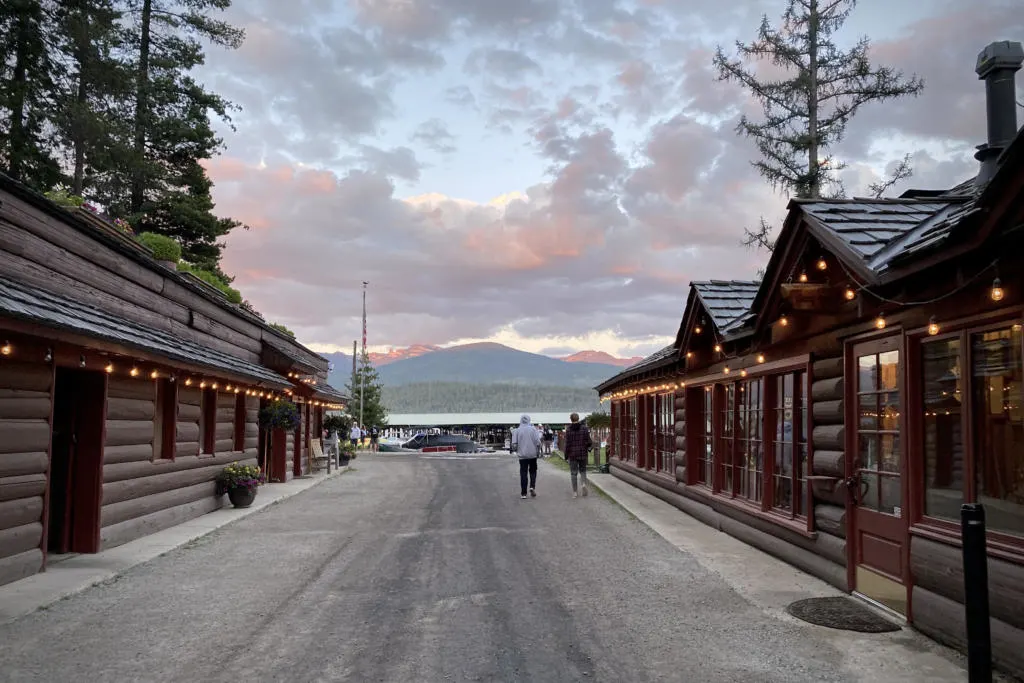
In the summer of 2020, we worked at a resort on Priest Lake in Northern Idaho. Elkins resort is a popular boating destination in the summer. The resort brings on lots of seasonal employees every summer. Jobs range from restaurant staff and dock attendants to maintenance and housekeepers. We found the job posting on Coolworks.com.
We liked that Elkins was very familiar with vanlife and was prepared to offer us jobs as a package deal. There are very few other places to work in that area. And we got to have the same days off, which is very important when we share one vehicle (that is also our house).
Emily and I both worked in the restaurant, I cooked pizzas and Emily actually started as a busser and was promoted to manager in a couple weeks. I guess they noticed she was a trustworthy and detail-oriented worker!
Overall we had a great experience there, and have considered going back again. We made a decent hourly wage and tips were quite good. Even chefs got tips too!
We loved our co-workers there, everyone was so friendly. It felt like summer camp for adults. We had many fun nights having bonfires and bar nights with our new friends. In our free time, we would go hiking, kayaking, boating, or just relaxing by the lake.
The area is crazy remote, which was good and bad. Good because we were mostly insulated from Covid-19, and because we love wide open wilderness without crowds. Seriously, we went on some amazing hikes and barely saw a single person.
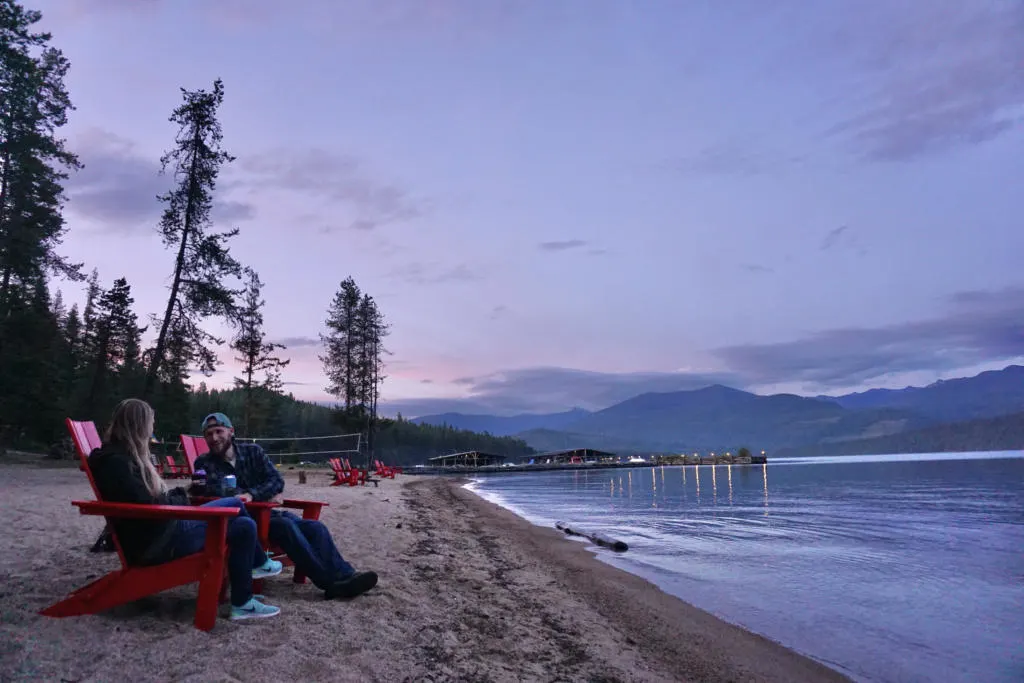
But the remoteness of Elkins was bad because there were very few options for shopping and it was quite isolated from civilization. We struggled to get good enough wifi or cell signal to get work done on our blog. The free time that we did have to work on this blog didn’t feel very productive because of the slow internet speeds. And at the only local market the food and beer were expensive. So unless we felt like driving an hour each way, we would keep our grocery purchases pretty limited. But working in the restaurant also meant we got lots of shift meals, so that helped.
And we were a little bit too far away from some of the places that we really wanted to visit. We had envisioned taking weekend trips to Oregon, Washington, Montana, and central Idaho. But with the exception of eastern Washington, most things were a little too far out of reach for a weekend trip. Pretty much the sole ‘big trip’ we took that summer was to Glacier National Park for a weekend, and were totally blown away by the beauty (Youtube vlog here).
Elkins resort has some housing for employees, which was a flat rate of $300/mo per person. But the price was the same no matter if you were living in one of their cabins or parking your campervan on property. We found the $600 per month just for a place to park a little pricey. So instead we opted to camp at the surrounding free camping options. The trade-off was that we had to drive 10-35 minutes to work every day, depending on the location. Luckily, they did still let us use the showers on site.
Ski Butlers | Ski Rental Delivery
Vail, Colorado
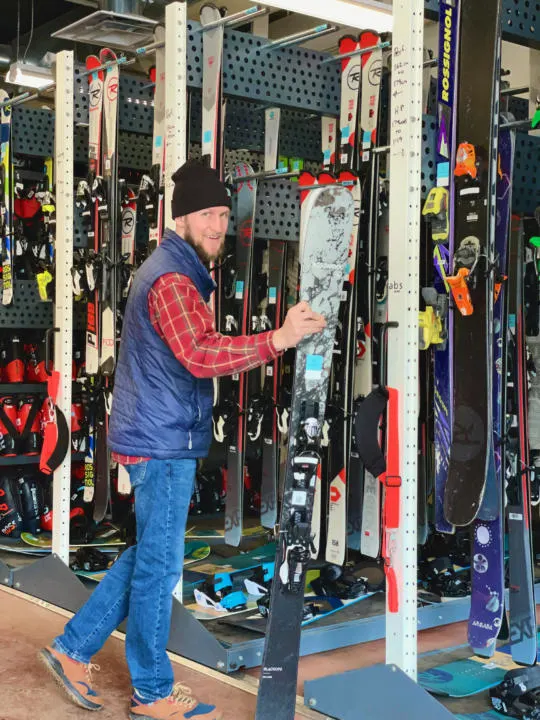
In the ‘18-’19, and ‘21-’22 winters I worked at Ski Butlers in Vail, Colorado. It’s a winter seasonal job that runs from November to April. Ski Butlers is a ski shop that delivers ski and snowboard rentals right to people’s accommodation (hotel, condo, airbnb, etc.). It’s a seasonal job that I definitely liked enough to return to for another season. One of the main perks offered is an Epic Pass which grants you access to all ski resorts under the Vail Resorts umbrella. (Though many jobs in ski towns offer a ski pass).
The two main seasonal positions within the company are Ski Technician and Team Lead. The Ski Techs are the ones who actually deliver the equipment with our fleet of vans, and also tune and pack equipment for orders. The Team Lead is more like a shift manager, who plans the delivery routes, answers phones, and occasionally does deliveries. I have been a Team Lead both years and like the position a lot.
Both positions are tipped +hourly. The Ski Techs get tips directly from customers while on deliveries, and the Team Leads get a percentage of the pooled credit card tips. The job (at least at the Vail shop) is quite lucrative. Staffing in ski towns is getting increasingly challenging, so Ski Butlers guarantee a combined $20 per hour between hourly and tips. That is, they will pay the difference if you end up making less than that. But we are consistently making way more than that.
But it’s not just about the money. Ski Butlers has a great culture, the company’s core value is people pursuing their passions in the mountains. And yes, that includes staff. I genuinely feel supported by my boss and coworkers to achieve my goals outside work, whether that’s getting a couple hours off to ski fresh pow or something else. The staff is usually made up of like-minded people, stoked on the outdoors and know how to have a good time.
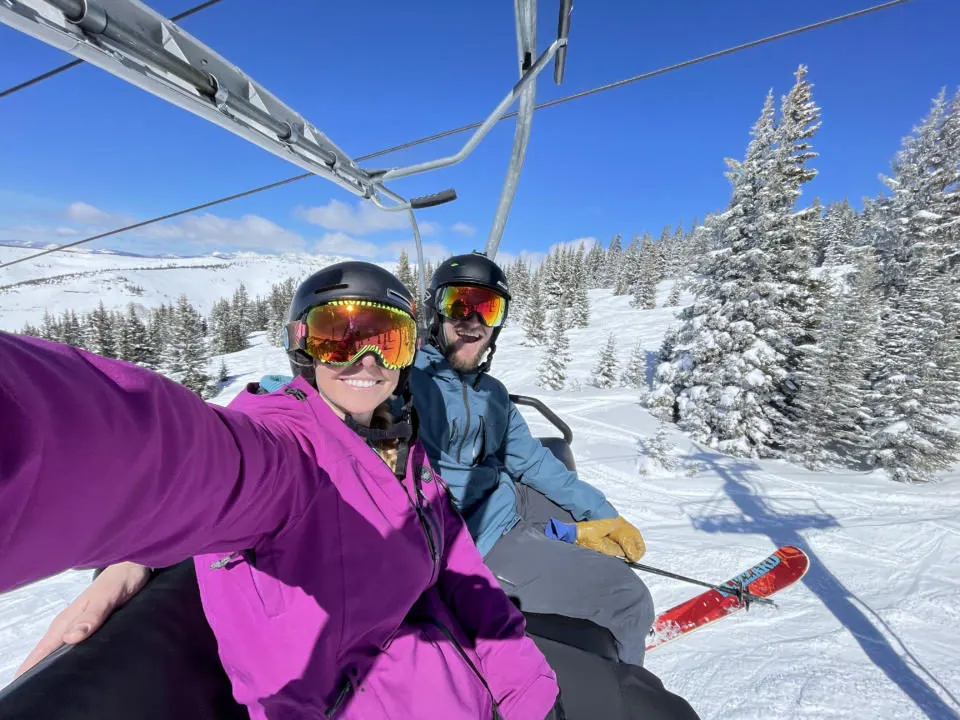
But like any job, there are some negatives/challenges. Ski Butlers is not immune to the staffing woes of ski town businesses. And sometimes those staffing issues put undue pressure on the existing staff and leads to the overworking that I mentioned earlier in this post.
The other challenge of the job is mostly physical, especially for Ski Techs. The Team Leads are somewhat insulated from a lot of the heavy lifting by being in the shop. But ski techs are regularly loading vans with over 75lb bags of ski gear, and lugging it through hotels, up flights of stairs, and more. Also driving large vans on the snowy mountain roads is a challenge for some, but vanlifers are at least comfortable with half of that equation.
And lastly, the biggest challenge from a Vanlife perspective is where to park at night. I can’t speak much for other ski towns, but Vail is notoriously strict about parking and overnight camping. Even people who do rent a place don’t always get a parking spot. We made the tough decision to rent an apartment for this winter. We would have preferred to live in our van, but it’s really not that feasible in Vail in the winter. However, I do currently have a Skoolie-dwelling coworker who is making it work, but it’s not always easy for her. Often being told to “move along” when she’s parked in a place she shouldn’t be. I wouldn’t dare share her “spots” on the world wide web.
And Ski Butlers in some locations has recently begun starting to provide employee housing as an option. So that could be a possibility if you don’t want to spend a really cold winter in your van.
Yeti’s Grind | Coffee Shop
Vail, Colorado

Our very first summer vanlifing we both worked at Yeti’s Grind coffee shop, in Vail. And Emily is back working there again as a barista this winter. It’s a job that we both enjoy very much. Sure it’s a little repetitive like most barista jobs, but the money is quite good. The hourly wage is in the teens, with hourly tips that regularly double that.
It’s maybe not technically a seasonal job since they are open year-round. But they definitely hire lots more staff for the busy summer and winter periods. We absolutely love the owners of Yeti’s Grind. They are the type of people who give you their undivided attention and genuinely care about the wellbeing of their staff.
Yeti’s Grind suffers from the same challenges of any winter ski town job. Some trouble finding staffing in a place where housing is expensive and scarce. And for vanlife it’s nearly impossible to find places to park overnight that provide a reasonable commute.
However, Yeti’s is also open in the summer, when the campgrounds and forest roads are open. So that makes it more feasible for vanlife during the summer. And somewhat surprisingly Yeti’s is even busier in the summer, so the tips are better.
Seasonal Jobs We Didn’t Like
Finding seasonal work that we like can be hit or miss, no surprise there. I don’t really want to call out any specific businesses or employers by name in this section. But I will outline some of the reasons that we didn’t like some past seasonal jobs.
When I think about it, most of the seasonal jobs I have disliked come down to not making enough money. If the money isn’t good enough, you kind of feel like you wasted that time. After all, if you don’t make enough money to take a good chunk of time off, then it kind of defeats the purpose.
Some jobs were tipped positions that didn’t quite deliver the goods. When you accept a tipped position, you never really know how much money you will make. And some jobs just haven’t turned out to be that lucrative. So that’s just kind of part of the gamble.
Or other jobs we worked during the wrong time of year. We worked in Sedona, Arizona one winter. But that’s their slowest time of the year, so we didn’t make much money. Don’t get the wrong idea, we love Sedona (we’re even getting married there). But yeah, winter is probably not the best time to work there.
Conclusions | Seasonal Jobs
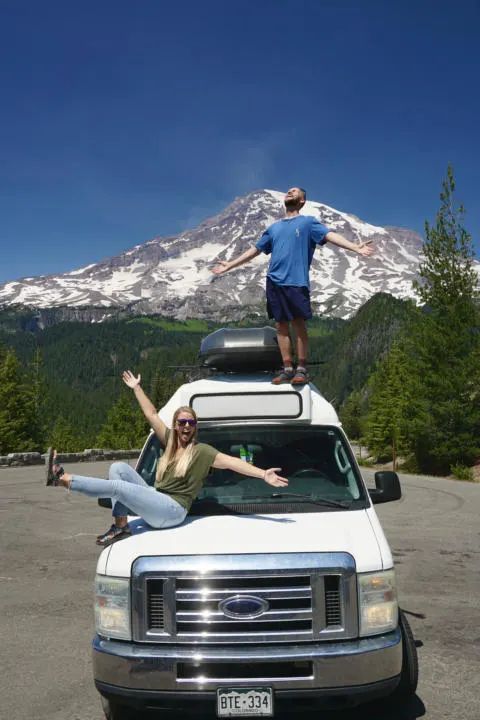
We honestly cannot envision our lives without seasonal work. We never planned to become seasonal workers, but rather just fell into it by accident when we moved to a ski town. And once we became accustomed to having several months off every year, we never wanted to give that up. And that’s what ultimately led us to start vanlife.
It’s always scary for anyone starting vanlife not knowing how you are going to make money on the road. At the time, our travel blog wasn’t making much money at all. But were actually quite confident that we would be able to support our lifestyle with seasonal jobs, even if our blog never “made it”.
Sure there are positives and negatives to seasonal work, but the same can be said about any kind of employment. One big challenge is trying to determine how much a tipped position will actually make. It’s somewhat of a gamble accepting a tipped position in a new place because you don’t really know what the earnings are like.
And the other major challenge for our life is finding winter seasonal work that works for vanlife. Ski towns tend to make up the majority of winter seasonal jobs. There aren’t too many other places in the US that have a busy tourism season in the winter. So despite the abundance of great winter seasonal jobs, finding a place to camp in a van overnight in mountain towns is still a big challenge. You may need to pay for housing or find jobs that provide housing.
As we’ve grown up with this life through our twenties, we do find ourselves being a little more picky about the jobs we accept. Fresh out of college we weren’t as concerned with the pay, but just happy to be having incredible experiences. But as we’ve gotten older, we are a little more focused on jobs that pay well, so that we can pay off loans, and save up for our future goals.
Ultimately, for us, seasonal work is just such a good pairing with vanlife and travel. It has allowed us to sustain our lifestyle, while also having free time to adventure and create this blog. We hope this guide helps you explore what amazing opportunities are out there to live and work in some incredible places.
Help Share “How To Work Seasonal Jobs To Sustain Vanlife Travel” On Pinterest!
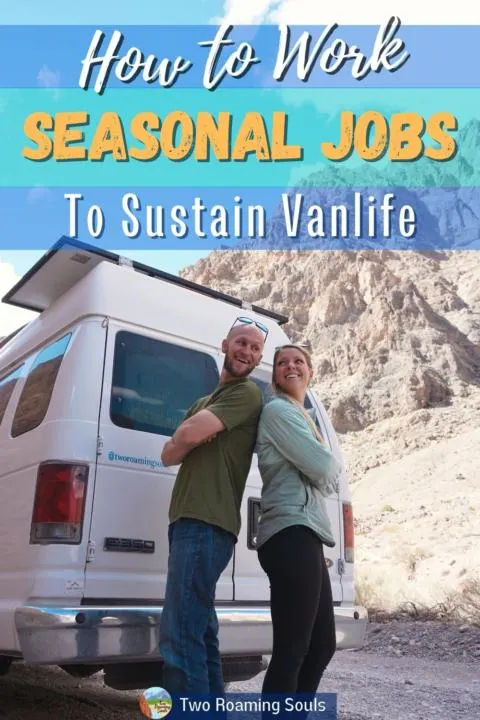
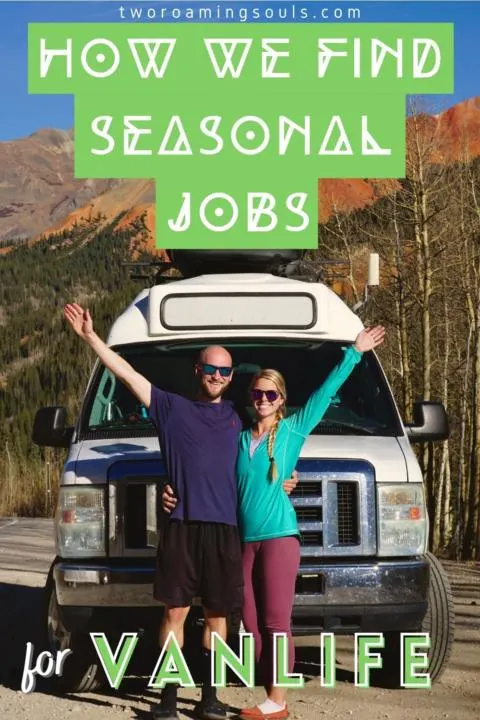

Glamping at Elkins Resort On Priest Lake | IWTN
Monday 9th of October 2023
[…] source: elkinsresort.com Experience the romance of nature and luxury at Elkins Resort on Priest Lake. Immerse yourself in vibrant seasonal wonders, rustic elegance, and gourmet […]
How To Know If Vanlife Is Right For You? - tworoamingsouls
Tuesday 4th of April 2023
[…] payment in a free place to stay makes it worth it. But you might also be able to find some great vanlife seasonal jobs that do […]